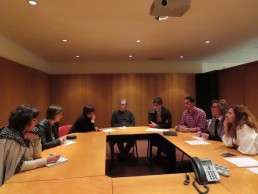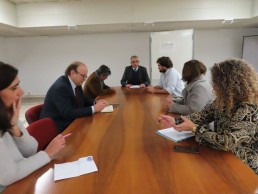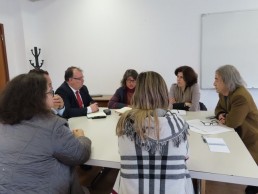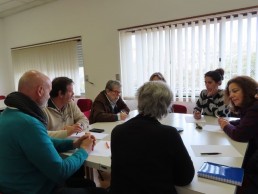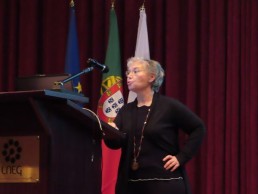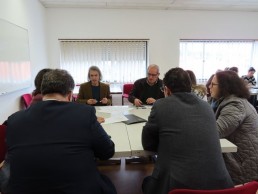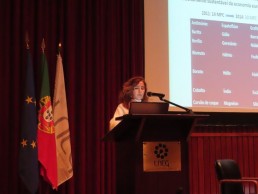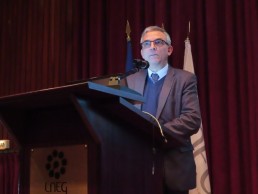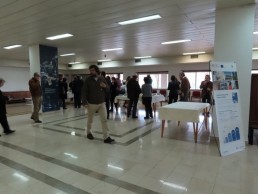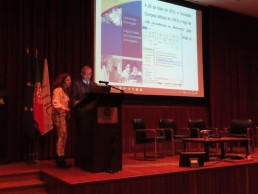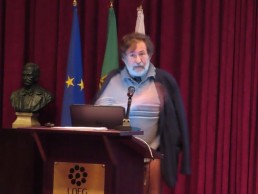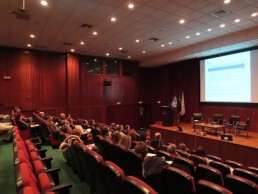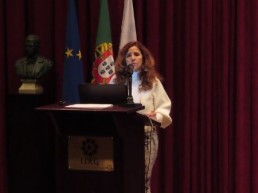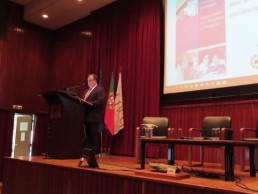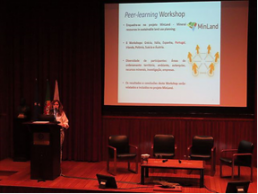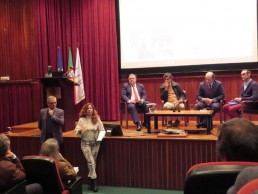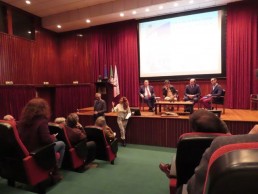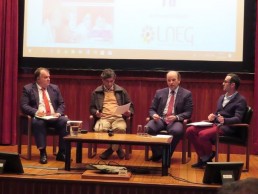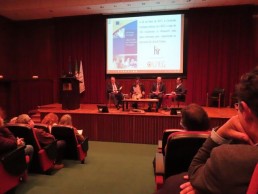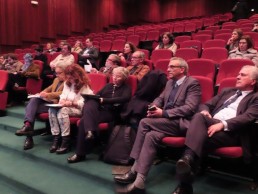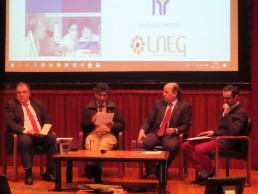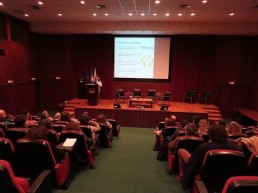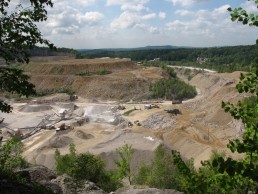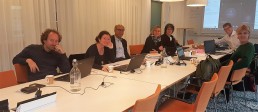MinLand Workshop: The opportunity to integrate mineral Resources in Land-Use Planning in Portugal
MinLand Portuguese Workshop is done: the opportunity to integrate mineral Resources in Land-Use Planning
February 4, 2019
The MinLand workshop, organised by LNEG and DGEG, was held on January 23, 2019 in the Auditorium Carlos Ribeiro, at the LNEG Campus in Alfragide.
The event was attended by 47 representatives of 10 regional and national entities involved in the Land-Use Planning, Mineral Resources and Environment decision-making process.Representatives of private companies also attended the workshop.
The workshop started with presentations related to the integration of mineral resources in land-use planning. These were followed by a discussion at four roundtables on the following issues:
- How to consider the concepts of “Potential Area” and “Complementary Exploitation Area” in the municipal land use plans?
- What is the public perception of the importance of mineral resources?
- It is easy to get new mining permits in areas that are not designated in land use planning for the exploitation of mineral resources?
The discussion was fruitful allowing reaching some conclusions:
The difficulties in safeguarding mineral resources through land use planning are fundamentally related to the lack of a national sectoral plan for mineral resources and the low flexibility of other sectoral plans in their relationship with minerals. In addition, these difficulties are directly related to a decisive factor, which is the low public acceptance for mining as a result of misinformation.
The proposed solutions involve the establishment of a sectoral plan for mineral resources, the creation of mechanisms to improve the flexibility of the municipal land use plans, raise awareness among the public on the need of mineral resources through education in schools, media, social networks, and a need of more transparency by mineral exploration companies. It was also unanimously proposed that a bigger percentage of royalties should be allocated to social actions at the community where mining is carried out.
MinLand Newsletter #1
Check out the MinLand newsletter! Edition #1 consisting of interview with the project coordinator and information about MinLand case studies!
Click here to download the newsletter.
MinLand Workshop in Poland – Mining activity in complicated environmental and spatial conditions (on the example of Czatkowice Limestone Mine)
The MinLand workshop, organised by MEERI PAS (Mineral and Energy Economy Research Institute Polish Academy of Science), was held on October 8, 2018 in Krzeszowice (Malopolska province) in the Czatkowice Limestone Mine.
Aim of Polish Local Workshop was discussion about possibility of mining activity in complicated environmental and spatial conditions (based on case study – Czatkowice Limestone Mine). The expansion of exploitation was related to the complicated local environmental conditions associated with occurrence of landscape park (the new part of deposit is located in park boundary), natural reserve, Natura 2000 area, Monastery Complex and drinking water intakes. Starting the mining activity required many activities related to abolition of extraction ban in landscape park, obtaining of environmental decision and changes of local spatial planning documents.
The meeting was attended by 27 experts from the following institutions: central authorities, regional government, local government, consulting companies, research institutions and industry.
The workshop was divided into three parts: presentations connected with MinLand project, detailed characteristic of Czatkowice Limestone Mine and technical visit at the Czatkowice mine.
The roundtable discussion was fruitful allowing reaching some conclusions:
- properly implemented spatial planning system on the local level (commune level in Poland) may decide on success - it takes into account the all environmental conditions of the development of a given commune, including the occurrence of the documented mineral deposits;
- it is necessary to ensure proper provisions in the documents regulating the functioning of various forms of nature conservation (e.g. landscape parks);
- the commune's experience suggests the need to update local planning documents even every 5 years (but they should take into account the perspective of at least 10 years);
- facilitation for mining entrepreneurs (shortening procedures) is the possibility of parallel work on amendment of local spatial planning documents (the Study of Conditions and Directions of Spatial Development of Commune and the Local Spatial Management Plan of Commune (in Polish hierarchy of spatial documents the Study.. is superior document in relation to Local Spatial...));
- it is necessary to improve (shorten) procedures related to environmental impact assessment and obtaining environmental decisions;
- properly conducted dialogue with the local community and local authorities may decide on success (CSR could be the key to success);
- it is much easier for mining entrepreneurs to operate in municipalities with a mining tradition (brownfield projects). The real challenge is to start a mining activity in "greenfield land".
Click here to download the report.
Open call for E-Delphi survey: Future stakeholder needs and interests in mineral safeguarding and land use
Dear Mining & Land Use Planning Expert
Competition between land uses in Europe is expected to remain strong in the coming decades and many European mineral deposits are at risk of not being adequately protected for future potential use. Technology is rapidly changing and demand for new materials is emerging. What will be the consequences for Europe? Will European mineral resources become more important
in the future? How can we ensure they remain protected?
We´re conveying an online DELPHI Survey between 29th October and 30th November 2018 to collect your vision on future stakeholder needs and interests associated with land use planning and mineral safeguarding in Europe. If you are interested and able to voluntarily
devote around 3 hours to the whole study in that period, please REGISTER HERE: bit.ly/2yJPbJQ and we will evaluate your profile with a chance to becoming part of our Panel of Experts. We look forward to receiving your application.
Deadline: 25 October 2018.
Warm regards from the MINLAND team!
Do not hesitate to contact us in the case of any questions on blazena.hamadova@minpol.com
Click here to download this file.
Assessing the quality and status of collected data and case studies: Work package leaders of WP2, WP3, WP4, WP5 and WP8 meeting
During the first half of year of the project, WP2 (Land Use Planning Policies & Practices) collected and structured data on minerals and land use in Europe. During the same period, WP 3 (Case studies of land use planning in exploration and mining) selected, described and analyzed 15 cases around Europe relative to minerals entering land use plans for aspects that represent good practices within the stream tackled by MinLand project.
MinLand work package leaders of WP2, WP3, WP4, WP5 and WP8 met at the Geological Survey of Sweden in Uppsala, from 17 to 18 September 2018, with the main objective to access the quality of content of the data obtained within WP2 and WP3 and for the need of WP4 and WP5. Furthermore, necessary coordination between WP2, WP3, WP4, WP5 and WP8 were discussed.
Finally, the Board worked on preparation of several local workshops for stakeholders that will take place from October 2018 to February 2019.
Minerals entering land use plans: Case studies from all around the Europe
By the end of the summer, 15 cases around Europe relative to minerals entering land use plans have been selected, described and analysed for aspects that represent good practices within the stream tackled by MinLand project.
Aspects that are addressed include evaluation of functionality of different policy and land use planning systems integrating mineral information, the values attributed and the measures adopted to safeguard mineral resources in national contexts, the transparency of the processes and societal aspects.
Cases that addressed specifically land use planning and policy making have been from Austria, Portugal, Greece, Norway and Ireland and they highlight also aspects of communication between authorities and of transparency. Cases that address sites, their development and their role in land planning, social acceptability/community engagement are from Finland, Sweden, Poland, Hungary, Greece, Italy, Ireland.
There are cases that address open mining and underground mining stressing the fact that In some countries coexistence is possible between different land uses including mineral exploitation activities. There are cases that address different density areas and various commodities. The cases will be uploaded in the result page and they are matter of discussion within different workshops in Europe. They are under evaluation in the project activity to potentiate transferability of the good practice aspects.
Check out the brochure of MINLAND Project
The MINLAND project has been designed to meet the challenges of competing land use from many different needs. Therefore, securing access to land for exploration and extraction of minerals, including critical raw materials in an integrated optimized process is of great importance.
Check out the brochure and learn more about the MINLAND Project.


